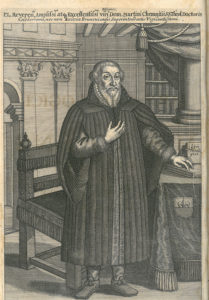by Rev. Brian Flamme
 The Bible is God’s Word. Christians don’t say this figuratively or metaphorically, as if the Bible is “like” God’s Word. Nor do we say this with the caveat that it might contain God’s Word. It is, literally, God’s Word.
The Bible is God’s Word. Christians don’t say this figuratively or metaphorically, as if the Bible is “like” God’s Word. Nor do we say this with the caveat that it might contain God’s Word. It is, literally, God’s Word.
Human reason staggers at the idea of an infinite, immaterial, and almighty Deity speaking, let alone having his words written down in a book. But this is what the Bible asserts. God speaks creation into existence (Genesis 1:1, 3; Psalm 33:6). He speaks his will for his creatures (Genesis 1:28; Exodus 20:1-17). He speaks rebuke against sin (Deuteronomy 30:17-18). He speaks redemption through his Word made flesh, Jesus, who died and is risen to save you (John 1:14, 16-17; Romans 4:25).
It pleases God’s Son, Jesus, to speak through the preaching of his prophets, apostles, and evangelists (Luke 10:16). This Word is recorded in the Scriptures. It’s not some strange or unknowable collection of symbols that God uses in the Bible. Through human language, God reveals the depths of his heart. He uses words with definitions, grammar and syntax that you learn in grade school, and types of literature–like history and poems–that are common to all.
God uses clear human language because he intends to be understood and believed. Apart from this divinely revealed speech, you would never know that Jesus died to give you life (John 3:14-17). That’s why he’s published his Word and created an office of ministry from which this Word is to be preached publicly (Matthew 28:18-20; Mark 16:15).
We can say a lot about God’s Word. The Bible is “God-breathed” or inspired (2 Timothy 3:16). It is true and without error (Psalm 119:60). It cannot fail (Psalm 18:30). It is sufficient for your salvation and Christian life (Psalm 19:7-8; 2 Timothy 3:16-17). It is powerful to give forgiveness and life (Psalm 119:25). It is clear (Psalm 119:105). Theologians call these the “attributes” of Holy Scripture.
 These attributes must be grasped by faith because every single one of these attributes is under the devil’s attack. He surrounds each attribute with a cloud of doubt. Why? Because he wants to destroy your confidence in what the Scriptures teach about your salvation in Christ Jesus. One of the ways he attacks is by saying that the Scriptures aren’t enough to know the sum of Christian teaching and life, that something more must be added to give us a fuller picture of God’s intentions. It’s an old trick. He said as much at the beginning of time when he tempted Eve with greater wisdom than what God had given her through his spoken Word (Genesis 3:5).
These attributes must be grasped by faith because every single one of these attributes is under the devil’s attack. He surrounds each attribute with a cloud of doubt. Why? Because he wants to destroy your confidence in what the Scriptures teach about your salvation in Christ Jesus. One of the ways he attacks is by saying that the Scriptures aren’t enough to know the sum of Christian teaching and life, that something more must be added to give us a fuller picture of God’s intentions. It’s an old trick. He said as much at the beginning of time when he tempted Eve with greater wisdom than what God had given her through his spoken Word (Genesis 3:5).
During the years leading up to the Reformation, the Roman papacy had convinced much of Christendom that the Scriptures were not enough to settle questions of doctrine and life. The reasoning usually came from the fact that there were controversies over the teachings of the Scriptures and the heretics themselves would argue from the Scriptures for their corrupted positions. Thus, Rome argued that Scripture needed additional authorities, like the voices of the fathers, councils, canons, and even the voice of the pope himself. Luther gives us a bit of the story that led up to this in his 1527 treatise “That these Words of Christ Still Stand.”

“Since every faction claimed Scripture for itself and interpreted it according to its own understanding, the result was that Scripture began to lose its worth, and eventually even acquired the reputation of being a heretics’ book and the source of all heresy, since all heretics seek the aid of Scripture. Thus the devil was able to wrest from the Christians their weapons, armor, and fortress (i.e. Scripture), so that it not only became feeble and ineffective against him, but even had to fight against the Christians themselves. He got Christians to become suspicious of it, as if it were plain poison against which they had to defend themselves. Tell me, wasn’t that a clever scheme of the devil?
Once Scripture had become like a broken net and no one would be restrained by it, but everyone made a hole in it wherever it pleased him to poke his snout, and followed his own opinions, interpreting and twisting Scripture any way he pleased, the Christians knew no other way to cope with these problems than to call many councils. In these they issued many outward laws and ordinances alongside Scripture, in order to keep the people together in the face of these divisions. As a result of this undertaking (though they meant well), arose the sayings that the Scriptures were not sufficient, that we also needed the laws and the interpretations of the councils and the fathers, and that the Holy Spirit did not reveal everything to the apostles but reserved certain things for the fathers. Out of this finally developed the papacy, in which there is no authority but man-made laws and interpretations according to the “chamber of the holy father’s heart.””[i]
Luther is exposing the devil’s playbook. He would take our “weapons, armor, and fortress” away from us. Without the Scriptures, there is no antidote against his venom of accusation against sin, there’s no hope for life in the face of death, and the world appears hopelessly lost to meaningless destruction. No philosophy, man-made laws, and extra-biblical revelations will help to stem the devil’s attacks.
 Yes, it’s true that there are dissensions over the Scriptures, but that doesn’t imply–no matter how much the devil would convince us otherwise–that the Scriptures are weak and insufficient for teaching and morals. Take this principle to heart: just because something can be abused doesn’t mean that we’re dealing with something that’s worthless and powerless.
Yes, it’s true that there are dissensions over the Scriptures, but that doesn’t imply–no matter how much the devil would convince us otherwise–that the Scriptures are weak and insufficient for teaching and morals. Take this principle to heart: just because something can be abused doesn’t mean that we’re dealing with something that’s worthless and powerless.
Rather than fleeing to another authority like reason or tradition, Luther doubles down on Scripture to argue for the true teaching on justification and Jesus’ bodily presence in the sacrament.
“Now in our day, having seen that Scripture was utterly neglected and the devil was making captives and fools of us by the mere straw and hay of man-made laws, we have tried by God’s grace to offer some help in the matter. With immense and bitter effort indeed we have brought the Scriptures to the fore again and released the people from man-made laws, freed ourselves and escaped the devil, although he stubbornly resisted and still continues to do so.”[ii]
The sufficiency of Scripture continued to be a hallmark of Reformation theology among the Lutherans. They would indeed bring in arguments of reason and authorities from tradition to establish their points, but only insofar as they stood under the judgment of Scripture. If they had neither reason nor tradition, the Lutherans wouldn’t care. God’s Word has already said enough. As Robert Preus writes, “Indeed, the entire doctrine of Biblical authority in Lutheran theology stands or falls with Scripture’s sufficiency.”[iii]
Martin Chemnitz, one of the chief authors and theologians behind the Formula of Concord, writes,

“The sacred Scripture is the cannon, norm, rule, foundation, and pillar of our whole faith, so that whatever is to be accepted under this title and name that is the doctrine of Christ and of the apostles must be proved and confirmed in Scripture. For in religious controversies all things must be tested and examined according to this norm in such a way that the saying of Jerome remains in force: ‘Whatever does not have authority in Holy Scripture can be rejected as easily as it can be approved.’”[iv]
Practically speaking, this attribute of Scripture should comfort you in a world that has amassed voices and authorities from every corner trying to tell you how to live your life and how to be a good person. Outside of the Scriptures, you find nothing but doctrines about works righteousness and God’s love apart from Christ. None of this can save you from God’s judgment against sin and the penalty of death. Christ can and does save you. He comes to you by his all-sufficient Word. If you have the Scriptures, you have heaven itself. If you have the Scriptures, you have every blessing that God desires to give your body and soul. If you have a pastor who preaches the Scriptures from the pulpit, then he is faithful and shepherding souls to life. If he knows nothing of the Scriptures or doubts them, flee such churches as the devil’s traps. Dear friends, treasure your Bible and read it often. It has the words of eternal life (John 6:68).
The Rev. A. Brian Flamme is a pastor at Hope Lutheran Church, Aurora, Colo.
[i] LW 37:13-14
[ii] LW 37:15-16
[iii] Robert Preus, The Theology of Post Reformation Lutheranism (St. Louis: Concordia Publishing House, 1969), 309.
[iv] Martin Chemnitz, Examination of the Council of Trent: Volume 1, translated by Fred Kramer (St. Louis: Concordia Publishing House, 2007), 101.
